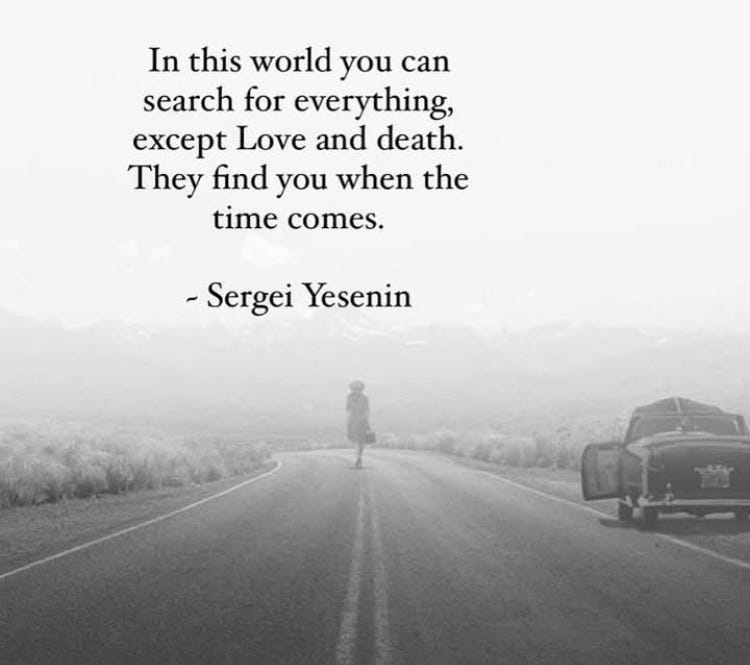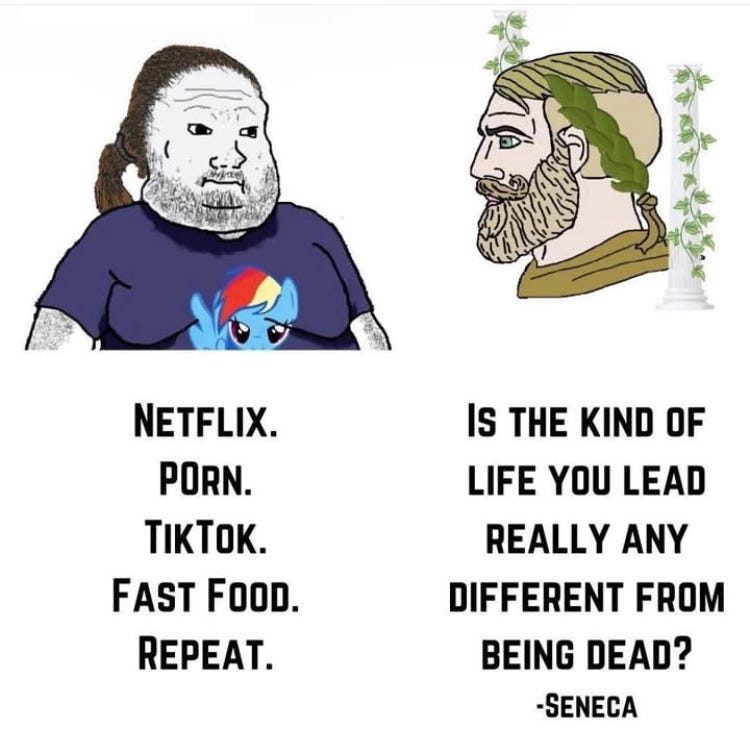The social divisions we see are deeper than politics or economics or even class. They are based in fundamentally different ways of seeing humanity, and life, and the world. On one side: people who see humans as social creatures who find happiness in duty and connection. On the other: people who revere the interior life of the individual, and the new tools we have to empower it.
I’ve already written about two competing ideological visions: one which holds that Western society is a worthy and benevolent structure upon which to build, and one which is opposed to the direction of Western history and desires a repudiation of that history and its values, and a pivot to something else.
But the difference goes deeper.
I see essentially two competing visions for life at play. They each have their strengths and until recently the ‘anti-Western’ contingent held sway at universities and among the educated and in some of the most productive sectors of society. That advantage seems to be slipping, as some of the anti-Western tactics and ideas have (predictably) turned out to be nonsensical and insane.
It’s important to emphasize that the differences go far deeper than politics, though, and that, regardless of the political outcomes, the anti-Western/progressive partisans have made their mark on our countries and our children and our psychology in a way that will never be completely undone. It’s naive to see this as a political struggle. It’s a spiritual and a philosophical fight, and the assumptions of progressive thinkers have saturated our lives in a hundred different and rarely noted places. The traditionalists might be winning the political fight, for now, but in which direction is our culture moving? Where are the trendlines of our families and our lifestyles and our children taking us? We might wake up in ten years and see the triumph of traditionalists and advocates of ‘common sense’ and nationalists and nativists and conservatives as a pathetic rear-guard spasm, which was subsumed by the inexorable movement of technology and culture.
Here are the two visions for life:
Pro-Western/traditional: this vision centers life around family and work. People are seen as citizens and as agents for responsibility and inspiration. Individual freedom is valued (as
has correctly noted, all major ideological currents on offer today are essentially versions of liberalism) but the pro-Western believers understand that individual liberty and license merely set the scope for decision and action; they don’t give meaning to life. Meaning comes from the individual, but that individual is nested within traditional systems of community and family and faith, and so the health of these things = the health of society. Historical ideas of duty and a priority on psychological resilience and ideological prudence are upheld. The worldviews of these people could be called ‘common-sense’ or ‘traditional.’ The central idea is that the individual is a social animal and must find validation and fulfillment and purpose within traditional social structures. The modern conception of authentic selfhood is an illusion, and the idea of pure individual freedom is a moral and psychological dead end.Progressive: this vision centers around individual fulfillment. This is seen not in terms of fulfilling social obligations or creating economic value or raising children, but in terms of gratifying a person’s own ambitions and desires. (Unless marriage and reproduction and service are things which really speak to an individual they’re ignored-no special emphasis is placed on them, and in many instances, they’re frankly discouraged as conformist and traditional, and hence irrational and irrelevant). The progressives have no real vision of military service or heroism or loving sacrifice because these things exist outside of the frame of the individual’s experience. They call to something greater, and within progressive assumptions there is nothing greater. The locus of this worldview is the individual and the impulses and plans of each individual are given almost mystical import. Where do these impulses and plans arise from? They emerge from a person’s ‘true’ self, which is deeper than, and separate from, social structures, and should be nurtured, and never inhibited, by society. This is the worldview which is much more concerned with safety, and affirmation, and validation. If these ideas sound radical and a little wonky, that is because they are. No human civilization has ever given the subjective experience of the individual so much weight, and this ideology can be understood as an outgrowth of our technological advances and our economic developments: for the first time people can live lives which are mostly alone, relating to others only in the ways and on the terms that they choose, devoting much more of their lives to scrolling and spending and chatting and emoting.
The central idea of the progressive worldview is that individuals should be free from constraint, social pressure, expectations-even disapproval. This quickly runs up against economic scarcity and biology and the other parameters of material reality but their desire is to transcend these limitations.
The downside of this worldview (aside from its severance of the individual from the community, which is the natural environment of existence for healthy humans for +1 million years) is that it’s really only realistic for healthy adults. The sick need care and can’t focus all of their attention on ‘being their authentic selves.’ Children need to be raised and guided. The ideas of this worldview become immediately absurd when people try to talk about the ‘authentic selves’ of children, who haven’t yet developed even basically workable forms of this. (Nevertheless, people often appeal to the ‘authentic selves’ of children now-until two decades ago this would have been a completely incoherent concept). The elderly need care and company-but healthy young adults working to ‘find themselves’ don’t usually want to spend time in the company of the old, and so the old are often forgotten and uneasily sequestered. This is a program for wealthier, non-elderly adults, although the first generation of children are now being raised alongside its assumptions, and there are millions of unhappy old people trying in vain to implement its heuristics in order to ‘find happiness’, despite a growing and uneasy realization that this is a very limited and materialistic vision, with no allowance for death, or faith, or even real and dutiful love. As death approaches many will look away from the emptiness they’ve been chasing, realizing that they now have nothing (and no one) else to turn to.
Governments very much want a society of progressive citizens because they’re easier to rule, and manage, and are more isolated and fragile. They depend upon programs for survival, they depend upon credentials for rank and status, they depend upon experts for guidance and validation. Ironically, progressives (who exalt the interior life of the individual) are actually quite conformist in questions of political ethics and taste. They lack a firm grounding of conceptions of right/wrong and so they look to society and social media and political influencers to guide their attachments. No doubt that’s partly because politics is seen, by the progressive, as symbolic and not fully real. The issues that absorb their enthusiasm are engaged with on the level of communication and identity and display-but little else. There’s a disconnect between political ideals and actual behavior (which I’ve written about) and this is a very comfortable situation for the regime, Such people will be disinclined to do the work of organizing, or make the sacrifices of a general strike, or run the risks of revolution. There’s something essentially childlike about their relationship with the larger society and the physical world.
The market and corporations also want a society of progressive citizens. They tend to be more lonely, more insecure, and more neurotic, and all of these flaws can be monetized. In reality, the dream of ‘being your true self’ often amounts to little more than buying certain goods and services, or taking vacations (to safe, expensive places), or using dating apps (but rarely committing or having children-commitment has no place in a world of fickle, individual desire), or cherishing certain images, or adopting certain conspicuously advertised values. This is all fairly harmless (even helpful-as I said) for the political managers, and it’s immensely profitable for the financial managers.
Much of our economy is essentially commodified addiction now. It creates a need, it creates a compulsion, it creates a crutch for happiness or ease, and it then sells these things. These imperfect, revenue-generating coping mechanisms create their own negative externalities, and then the treatments and programs to address those harms are also sold. The fast food is sold-so are supplements and gyms. Solutions which DON’T involve commerce (mindfulness, Buddhism, simple living. Stoicism, discipline) are minimized and not promoted. It’s a giant hamster wheel of consumption and display, all to make people feel good, healthy, worthy, loved, FULFILLED. The opinions that people adopt along the way might be political but they’re inactive and more concerned with appearance and signalling. There’s very little risk of the believers ever working to make change in the real world, because the real world isn’t their concern. They’ve retreated into a self-concerned and half-digital world of convenience and comfort and distraction.
Every major cultural issue of our time can be seen as a competition between these two visions. As I said, the Pro-Western/traditional vision has the weight of history and the temperament and socialization of the mass of ordinary people on its side… but that socialization is being eroded every day. As families weaken and adolescents and professionals descend further into solipsism and psychological distress, the old values will seem more and more distant. It will become hard to see how we can find our way back to them, against the onslaught of social media and OnlyFans and academia and ideology and insidious cultural change. Try to find a wife or a vibrant community these days, as a young American man. It’s not impossible, but it seems to become harder every day. Can the course of a culture be intentionally changed?
Here are some binary reframings of contemporary issues:
Immigration is a struggle between people who see the nation as a large unit of bound individuals who mostly share values and land (the traditionalists) and people who see the needs and desires of immigrants as supremely important. Needs and desires of individuals are extremely important to the progressives. They’re of paramount importance. The idea that borders or constitutions or some idea of national affinity could thwart the wishes of these vulnerable, worthy individuals is seen as obscene, incomprehensible.
Body positivity is a progressive reaction to the reality that women value male attention and men prize fit and physically attractive women. All that matters is how beautiful you feel, if you’re “living in a larger body” (notice the expression of the psyche as some kind of truer individual inside the physical form). Everyone is beautiful-because they are! The sense that beauty is a socially-defined quality and is therefore fixed by the outside world (and that a person might have to adjust his/her form to meet its standards) is offensive to the deepest progressive ideas. Society is a hindrance-subjectivity is all.
Euthanasia and managed death is considered to be a voluntary renunciation of one’s holy right to subjective experience in the progressive imagination. It’s enthusiastically embraced by progressives as an easy solution for difficult problems, like mental healthcare and medical spending. There’s no vision for God or life after death in this sterile and modern cosmology. Such matters make progressives nervous. God’s will would be a major constraint on the primacy of individual experience and desire and identity, and that’s unacceptable.
Multiculturalism is another issue in which these two visions create mutually incomprehensible values. The progressives don’t see culture as shaping or creating subjective outlooks (which is an absurd denial) because that would mean that something was a constraint on subjectivity, and that’s a possibility which challenges the very bases of the worldview. ALL people are (potentially) equally good, equally tolerant, equally worthy because all people have subjective experience. Discriminating against Afghans or Africans because of the silly accidents of culture and geography is invalid, according to progressives, and all people can and should be integrated into bountiful Western societies. Anything else is pure xenophobia.
Gender ideology has the quality of a mystico-religious notion, because it is. It is nothing less than the promotion of one’s ‘gender identity’ to the most important construct for the individual and society, and it’s based in a worldview which sees identity and desire and subjectivity as the most real and urgent aspects of reality. The possibility that basing policies on people’s subjective identities could cause serious real-world harm is anathema to these believers. They won’t countenance it. Because of their deep-seated faith they can’t.
What happens when children are trained up to gratify themselves and seek expression of their true selves above all else? We are beginning to find out.
Safetyism is the curse of modern Western parenting paradigms. Of course the anxiety and discomfort and struggles of kids would be conceptualized as terrible burdens, which should be-as much as possible-avoided. Anxiety and discomfort are closely bound up with invalidation and social challenges (Am I good enough? Can I do it? Will I be alright? Will I fail?) and invalidation and social challenge are seen as ipso facto illegitimate. There’s a growing realization that this view of the world is toxic for developing minds, but this realization isn’t enough to dethrone the progressive worldview. That worldview is a set of fundamental spiritual and ideological assumptions, and they’re based-as much as anything else-on disposition and faith. They arose out of new cultural realities, enabled by prosperity and technology, and they cannot be argued away. They’re not amenable to change by data (even data concerning mental health and childhood flourishing) and experience, because their roots too deep for those things to touch.
Feminism is now little more than a blanket affirmation of whatever a woman might want to do at any particular moment, and a vehicle for her to offload failure and negative reactions onto the concepts of sexism and patriarchy. Abortion is partly revered as a kind of sacrament because it liberates the individual woman from some of the strictures of biology, and it decreases births and erodes the natural duties of womanhood (if you become pregnant, expect to give birth). Some of this debate is about civic equality and women’s healthcare, but if you pay attention to the tone and the messaging you will find that the words and concepts used by the pro-choice movement have radically changed in the past 30 years. Abortion is now the liberation of the individual woman (with her dreams and desires) from the fetters of society. It is a glorious tool, to progressives.
Modern therapeutic and disability claims, pop psychology, anti-racism, Trump derangement… all can be seen as promotions of subjectivity and emotional reality above the reality of society or the world.
Please note that I refer to the traditional orientation as ‘Western’ because I’m in the West, and that is the scheme which progressive thinkers have been working to dethrone here for decades now. I suspect that this is actually a global struggle though: modernity (with its technology and comfort and wealth, and its isolation and neurosis and absurd concepts), against the roots of the old world.
I think we will begin to see-and have already begun to see-a more explicit progressive renunciation and opposition to the old bulwarks of traditional value: nuclear family, sincere faith, hometown, traditional morality, children, patriotism.
I’m not worried about the ideological allure or the lifestyle accoutrements of progressivism. It’s ethically incoherent and its contradictions pop up immediately (all cultures are equal? All people are beautiful? Thinking makes it so?). Yet it only seems to be growing in scale and pervasiveness, even as its political program suffers losses.
I worry that its values and goals are a natural outgrowth of our managerial-bureaucratic economies and our increasing reliance on technology and addiction to disposable income. Can you honestly tell me that family structures aren’t dying everywhere you look? That traditional notions of decency and personal responsibility aren’t on the wane? Can you even imagine a political and legislative solution to these trends? I cannot.
Please leave your comments below. I’ve been chipping away at this concept for months now and I feel like I’ve made progress. Some of my earlier writings explore similar themes, and those links are below.
More to come soon.














Excellent encapsulation of the challenges we face, particularly in the West. We need clarity to understand the nature of the threat, and this helps to provide that. Thank you!
I don't think a hyper-concern for individual interiority is anti-Western at all, but rather the opposite: it is Western civilization's values taken to the breaking point, a caricature of the European approach to human life. Most of the people outside the West who see the West as an enemy are far, far more collectively minded than Western conservatives--the (left wing) scholar Orlando Patterson noted in the introduction to his book *Freedom Vol. 1* that most human cultures have traditionally had no concept of what we would call freedom, and their closest equivalent usually meant something like "licentiousness". The mainstream of human culture throughout various places and ages is that you *are* your social role and the primary objective of the "good life" is to know your place and fit into your place. Even personal names are often contingent on your role in society and you receive a new name when you assume a new role. What the individual might want deep down inside is a particularly Western interest, and attempts to dissolve social roles and norms entirely are this tendency running out of control and obliterating all competing values.
I think one source of this confusion is the false belief that the ancient Greeks and Romans were the ancestors of our civilization. They were not; our civilization did not get going until around AD 750-800, in response to the defeat of the Moorish invasion of Frankia and the subsequent rise of the Franks to hegemony over northern Europe. Most Islamic and South Asian cultures understand this way better than we do, which is why so many of them call Westerners in general and white Westerners in particular some variant of "Franks"--Farangi, Franj, Ferengi (yes, Star Trek got the name from here), etc. We are not the descendants of classical antiquity's civilizations, but of its barbarians, who even then were noted by Romans as being more individualistic and prideful than the Romans, Greeks, or Punics.